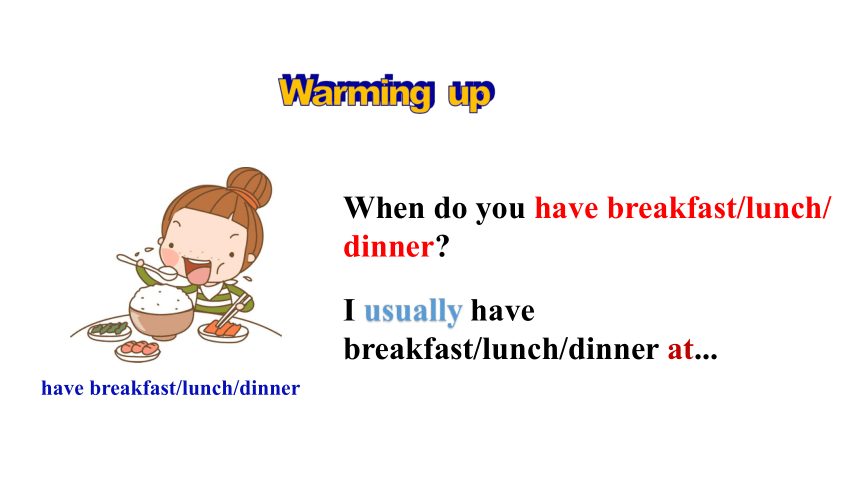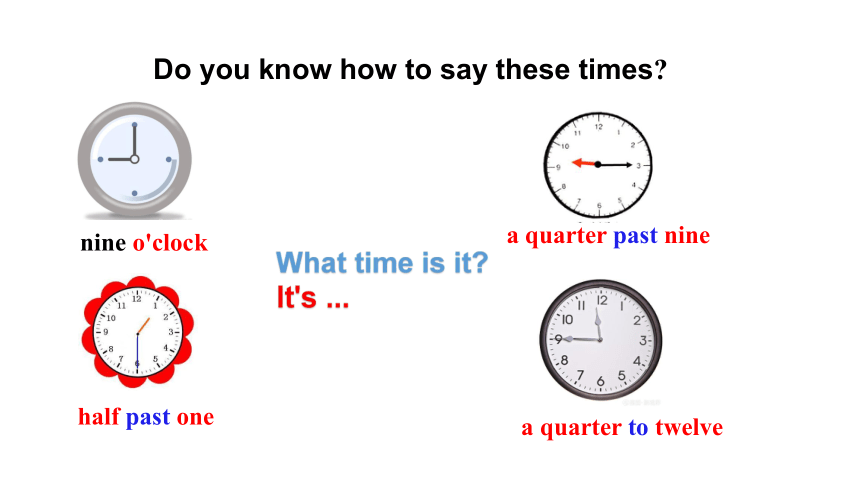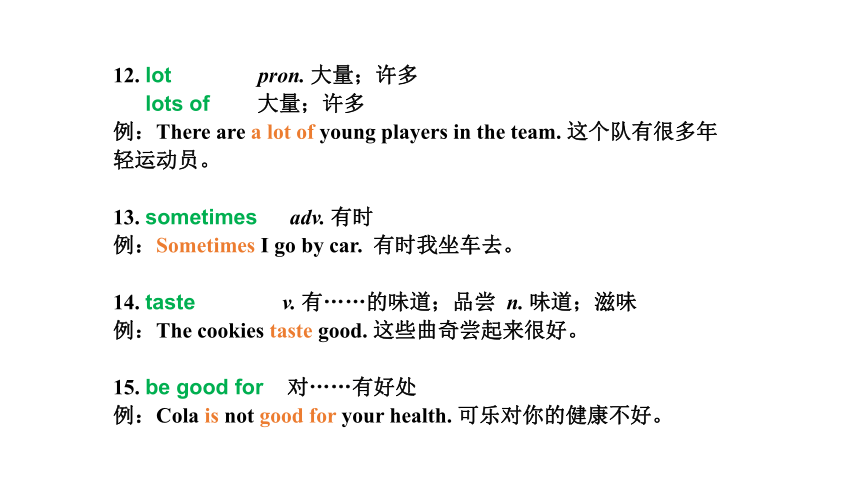人教新目标(Go for it)版七年级下册Unit 2 What time do you go to school? Section B 1a-2c课件(共36张PPT)
文档属性
| 名称 | 人教新目标(Go for it)版七年级下册Unit 2 What time do you go to school? Section B 1a-2c课件(共36张PPT) |

|
|
| 格式 | pptx | ||
| 文件大小 | 3.7MB | ||
| 资源类型 | 教案 | ||
| 版本资源 | 人教新目标(Go for it)版 | ||
| 科目 | 英语 | ||
| 更新时间 | 2024-05-02 00:00:00 | ||
图片预览












文档简介
(共36张PPT)
Unit 2
What time do you go to school
第 3 课 时
(Section B 1a~2c)
学 习 目 标
掌握本课时新词汇:
half,past,quarter,homework,run,clean,walk,do one‘s homework, take a walk,quickly,either,lot,sometimes,taste,either…or…,lots of,be good for
1
3
2
2
掌握以下句型:
—When do students usually eat dinner
—They usually eat dinner at a quarter to seven in the evening.
学 习 目 标
掌握运用询问所做活动的句型及其时间回答。
3
2. I don't have much time for breakfast, so I usually eat very quickly.
3. After school, I sometimes play basketball for half an hour.
4. When I get home, I always do my homework first.
5. She knows it's not good for her, but it tastes good!
Warming up
have breakfast/lunch/dinner
When do you have breakfast/lunch/
dinner
I usually have breakfast/lunch/dinner at...
When do you take a walk
I usually take a walk at...
take a walk
Do you know how to say these times
nine o'clock
half past one
a quarter past nine
a quarter to twelve
What time is it
It's ...
When is it
It's ...
in the morning
in the afternoon
Do you know how to say these times
Words and expressions
1. half n. & pron. 一半;半数
例:Half of the students live in the city. 半数的学生都住在城市里。
2. past prep. 晚于;过(时间)adj. 过去的
例:The past month was really busy . 过去的一个月真的很忙碌。
3. quarter n. 一刻钟;四分之一
例:The programme lasted an hour and a quarter.
这个节目历时1小时15分钟。
4. homework n.家庭作业
例:How much homework do you have on Friday 你周五有多少家庭作业?
5. run v. 跑;奔
例:Can you run as fast as Jack 你能和杰克跑得一样快吗?
6. clean v. 打扫;弄干净 adj. 干净的
例:Are your hands clean 你的手干净吗?
7. walk v. & n. 行走;步行
例:Why not walk to your school with me today
今天为什么不跟我一 起走路去你学校呢?
8. do one’s homework 做作业
9. take a walk 散步;走一走
10. quickly adv. 很快地
例:He ran quickly to catch the bus. 他迅速跑去赶公共汽车。
11. either conj. 或者 adv.也
either…or… 要么……要么……;或者……或者……
例: You don’t like it I don’t like it either.
你不喜欢它?我也不喜欢。
例:Either she or I am going there tomorrow.
明天要么她去那里,要么我去那里。
12. lot pron. 大量;许多
lots of 大量;许多
例:There are a lot of young players in the team. 这个队有很多年轻运动员。
13. sometimes adv. 有时
例:Sometimes I go by car. 有时我坐车去。
14. taste v. 有……的味道;品尝 n. 味道;滋味
例:The cookies taste good. 这些曲奇尝起来很好。
15. be good for 对……有好处
例:Cola is not good for your health. 可乐对你的健康不好。
When do students usually do these things Match the activities with the time of day.
1a
3
1
2
4
1b
Check your answers with your partner.
When do students usually eat dinner
They usually eat dinner at a quarter to seven in the evening.
They usually go to bed at a quarter to ten in the evening.
When do students usually go to bed
Pair work
When do students eat breakfast
They usually eat breakfast at seven in the morning.
They usually do homework at a quarter past four in the afternoon.
When do students do homework
1c
Listen and circle the activities you hear.
get up ____ 6. do my homework ____
run ____ 7. clean my room ____
eat breakfast ____ 8. eat dinner ____
go to school ____ 9. take a walk ____
go home ____ 10. go to bed ____
5:30
Listening
1d
Listening
Listen again. Write the times next to the activities you circled in 1c.
get up ____ 6. do my homework _______
run ______ 7. clean my room ____
eat breakfast _______ 8. eat dinner _______
go to school _______ 9. take a walk ____
go home _______ 10. go to bed _______
6:00 am
5:30
7:00 am
7:45 am
4:15 pm
5:30 pm
7:15 pm
9:00 pm
1e
Ask and answer questions about Tom.
When does Tom usually get up
He usually gets up at half past five.
Pair work
What time
does Tom …
…
Check (√) the activities you think are healthy.
2a
__ go to bed early __ eat ice-cream
__eat quickly __ eat vegetables
__ play sports __ take a walk
√
√
√
√
Tony and Mary are brother and sister.
They have healthy and unhealthy habits.
Who is healthier Circle the healthy activities.
2b
Tony
brother
Mary
sister
Who is healthier
Listening
Reading
Circle the healthy activities.
Read 2b again and fill in the blanks.
Time Tony’s activities
At eight __________
eats a quick breakfast
At eight thirty ________________
At noon __________________________________
After school ________________________________
__________________
In the evening ______________________________
At ten thirty brushes teeth and goes to bed
gets up
goes to school
usually eats hamburgers for lunch
plays basketball for half an hour
does his homework
watches TV or plays computer games
Read 2b again and fill in the blanks.
Time Mary’s activities
___________ gets up
takes a shower and eats a good breakfast
__________ goes to school
At twelve _____________________________
After lunch _____________________
_________________
in the evening At nine thirty ___________________________________
goes to bed
At six thirty
At eight thirty
eat lots of fruit and vegetables for lunch
sometimes plays volleyball
always eats ice-cream
does her homework, swims or takes a walk
Write down the unhealthy habits of each person. Then think of healthy activities for them.
2c
Unhealthy habits Healthy activities
Tony
Mary
gets up late
gets up early
has breakfast
quickly
has breakfast
slowly
usually eats hamburgers
eats lots of fruit and vegetables
eats ice-cream after dinner
Don’t eat ice-cream after dinner
Language points
1. half past six in the morning
half n. & pron. 一半。作名词时,复数形式为halves。
例:I cut the apple into two halves and give a half to my sister.
我把苹果切成两半,给了我妹妹一半。
Half of the boys like football. 这里一半的男生喜欢足球。
2. a quarter past three in the afternoon
past v. 过(时间)。“分钟数+past+钟点数”结构意为“几点几分”。
例:We will leave for Beijing at thirty past seven. 七点半我们将要出发去北京。
【拓展】past adj. 过去的,昔日的。
例:My grandma often tells us her stories in the past time.
我祖母经常给我们讲她过去的故事。
3. They usually eat dinner at a quarter to seven in the evening.
a quarter to seven 差一刻到七点;六点四十五分。其结构为“分钟数(现在距下一个钟点数的时间)+to+下一个钟点”,意为“差几分到几点”。
例:She finishes her class at a quarter to five.
她四点四十五分下课。
4. clean my room
clean v. 打扫。 作及物动词,后面直接接宾语。
例:We should clean our bedroom every day. 我们应该每天打扫卧室。
【拓展】clean adj. 干净的
例:We should keep the room clean. 我们应该保持房间清洁。
5. take a walk
(1) take 作动词,在此表示“做……事情”,常与名词连用,表示做与该名词意义相关的动作。
常见搭配:take a walk 散步;take a rest 休息;take a look 看一看。
例:Let’s stop working to take a rest. 咱们停止工作去休息一下吧。
(2) walk n. 步行;散步。常用短语:go for a walk=take a walk 去散步。
例:Jim takes a walk after dinner every day. 吉姆每天晚饭后要散步。
6. I don’t have much time for breakfast, so I usually eat very quickly.
much adj. 许多,大量。修饰不可数名词。
much water 许多水;much money 许多钱。
【拓展】much还可作副词,常与so、too等词连用,修饰动词。
例:My teacher talked too much yesterday and didn’t drink enough water.
我的老师昨天说太多话了,并且没有喝足够的水。
(2) quickly作副词,意为“迅速地;立刻”。其形容词形式为quick。
例:He works quickly. 他干活很快。
7. In the evening, I either watch TV or play computer games.
either 意为“或者”,“either...or...”表示“要么……要么;或者……或”,连接两个并列成分,如主语、谓语、宾语、表语或状语等。either...or...”连接两个主语时,谓语动词应与最近的主语在人称和数上保持一致。
例:Either you or I am going there tomorrow.
明天要么你去那里,要么我去那里。
8. At twelve, she eats lots of fruit and vegetables for lunch. lot 是代词,意为“大量;许多”,常用于固定搭配a lot of或lots of 中,均意为“大量;许多”,既可用来修饰可数名词复数又可修饰不可数名词。
例:I have a lot of/lots of friends. 我有许多朋友。
9. She knows it’s not good for her, but it tastes good!
(1)“be good for...”意为“对……好;对……有益”,其反义词组为“be bad for...(对……有害)”。
例:Cola is not good for your health. 可乐对你的健康不好。
(2) taste在此作系动词,意为“尝起来”,其后可接形容词。
例:The cookies taste good. 这些曲奇尝起来很好。
(3) taste还可作实义动词,意为“品尝”;也可作名词,意为“味道;滋味”。
例:Can you taste this soup? 你可以尝一下这个汤吗?
Summary
Main words and phrases:
We learned the words and phrases in this lesson, such as homework,take a walk, either...or...,lots of,taste
Main sentences:
We learned how to express the “time” on the clock.
一、汉译英。
1. 散步 __________
2. 早上六点半 ________________________
3. 打扫我的房间 ______________
4. 去睡觉 _____________
5. 或者……或者……
_____________
take a walk
half past six in the morning
clean my room
go to bed
either...or...
Exercises
1. Where does Kate ______ after school
A.does her homework B.do her homework
C.did her homework D.do his homework
2. There is little time left. We have to walk q________ to get there on time.
3. 步行有益于健康。
Walking ______ ______ ______ your health.
B
uickly
is good for
二、选择&填空。
1. Review the words and phrases we have learned.
2. Talk about the activities with your friends in 1c.
Homework
Unit 2
What time do you go to school
第 3 课 时
(Section B 1a~2c)
学 习 目 标
掌握本课时新词汇:
half,past,quarter,homework,run,clean,walk,do one‘s homework, take a walk,quickly,either,lot,sometimes,taste,either…or…,lots of,be good for
1
3
2
2
掌握以下句型:
—When do students usually eat dinner
—They usually eat dinner at a quarter to seven in the evening.
学 习 目 标
掌握运用询问所做活动的句型及其时间回答。
3
2. I don't have much time for breakfast, so I usually eat very quickly.
3. After school, I sometimes play basketball for half an hour.
4. When I get home, I always do my homework first.
5. She knows it's not good for her, but it tastes good!
Warming up
have breakfast/lunch/dinner
When do you have breakfast/lunch/
dinner
I usually have breakfast/lunch/dinner at...
When do you take a walk
I usually take a walk at...
take a walk
Do you know how to say these times
nine o'clock
half past one
a quarter past nine
a quarter to twelve
What time is it
It's ...
When is it
It's ...
in the morning
in the afternoon
Do you know how to say these times
Words and expressions
1. half n. & pron. 一半;半数
例:Half of the students live in the city. 半数的学生都住在城市里。
2. past prep. 晚于;过(时间)adj. 过去的
例:The past month was really busy . 过去的一个月真的很忙碌。
3. quarter n. 一刻钟;四分之一
例:The programme lasted an hour and a quarter.
这个节目历时1小时15分钟。
4. homework n.家庭作业
例:How much homework do you have on Friday 你周五有多少家庭作业?
5. run v. 跑;奔
例:Can you run as fast as Jack 你能和杰克跑得一样快吗?
6. clean v. 打扫;弄干净 adj. 干净的
例:Are your hands clean 你的手干净吗?
7. walk v. & n. 行走;步行
例:Why not walk to your school with me today
今天为什么不跟我一 起走路去你学校呢?
8. do one’s homework 做作业
9. take a walk 散步;走一走
10. quickly adv. 很快地
例:He ran quickly to catch the bus. 他迅速跑去赶公共汽车。
11. either conj. 或者 adv.也
either…or… 要么……要么……;或者……或者……
例: You don’t like it I don’t like it either.
你不喜欢它?我也不喜欢。
例:Either she or I am going there tomorrow.
明天要么她去那里,要么我去那里。
12. lot pron. 大量;许多
lots of 大量;许多
例:There are a lot of young players in the team. 这个队有很多年轻运动员。
13. sometimes adv. 有时
例:Sometimes I go by car. 有时我坐车去。
14. taste v. 有……的味道;品尝 n. 味道;滋味
例:The cookies taste good. 这些曲奇尝起来很好。
15. be good for 对……有好处
例:Cola is not good for your health. 可乐对你的健康不好。
When do students usually do these things Match the activities with the time of day.
1a
3
1
2
4
1b
Check your answers with your partner.
When do students usually eat dinner
They usually eat dinner at a quarter to seven in the evening.
They usually go to bed at a quarter to ten in the evening.
When do students usually go to bed
Pair work
When do students eat breakfast
They usually eat breakfast at seven in the morning.
They usually do homework at a quarter past four in the afternoon.
When do students do homework
1c
Listen and circle the activities you hear.
get up ____ 6. do my homework ____
run ____ 7. clean my room ____
eat breakfast ____ 8. eat dinner ____
go to school ____ 9. take a walk ____
go home ____ 10. go to bed ____
5:30
Listening
1d
Listening
Listen again. Write the times next to the activities you circled in 1c.
get up ____ 6. do my homework _______
run ______ 7. clean my room ____
eat breakfast _______ 8. eat dinner _______
go to school _______ 9. take a walk ____
go home _______ 10. go to bed _______
6:00 am
5:30
7:00 am
7:45 am
4:15 pm
5:30 pm
7:15 pm
9:00 pm
1e
Ask and answer questions about Tom.
When does Tom usually get up
He usually gets up at half past five.
Pair work
What time
does Tom …
…
Check (√) the activities you think are healthy.
2a
__ go to bed early __ eat ice-cream
__eat quickly __ eat vegetables
__ play sports __ take a walk
√
√
√
√
Tony and Mary are brother and sister.
They have healthy and unhealthy habits.
Who is healthier Circle the healthy activities.
2b
Tony
brother
Mary
sister
Who is healthier
Listening
Reading
Circle the healthy activities.
Read 2b again and fill in the blanks.
Time Tony’s activities
At eight __________
eats a quick breakfast
At eight thirty ________________
At noon __________________________________
After school ________________________________
__________________
In the evening ______________________________
At ten thirty brushes teeth and goes to bed
gets up
goes to school
usually eats hamburgers for lunch
plays basketball for half an hour
does his homework
watches TV or plays computer games
Read 2b again and fill in the blanks.
Time Mary’s activities
___________ gets up
takes a shower and eats a good breakfast
__________ goes to school
At twelve _____________________________
After lunch _____________________
_________________
in the evening At nine thirty ___________________________________
goes to bed
At six thirty
At eight thirty
eat lots of fruit and vegetables for lunch
sometimes plays volleyball
always eats ice-cream
does her homework, swims or takes a walk
Write down the unhealthy habits of each person. Then think of healthy activities for them.
2c
Unhealthy habits Healthy activities
Tony
Mary
gets up late
gets up early
has breakfast
quickly
has breakfast
slowly
usually eats hamburgers
eats lots of fruit and vegetables
eats ice-cream after dinner
Don’t eat ice-cream after dinner
Language points
1. half past six in the morning
half n. & pron. 一半。作名词时,复数形式为halves。
例:I cut the apple into two halves and give a half to my sister.
我把苹果切成两半,给了我妹妹一半。
Half of the boys like football. 这里一半的男生喜欢足球。
2. a quarter past three in the afternoon
past v. 过(时间)。“分钟数+past+钟点数”结构意为“几点几分”。
例:We will leave for Beijing at thirty past seven. 七点半我们将要出发去北京。
【拓展】past adj. 过去的,昔日的。
例:My grandma often tells us her stories in the past time.
我祖母经常给我们讲她过去的故事。
3. They usually eat dinner at a quarter to seven in the evening.
a quarter to seven 差一刻到七点;六点四十五分。其结构为“分钟数(现在距下一个钟点数的时间)+to+下一个钟点”,意为“差几分到几点”。
例:She finishes her class at a quarter to five.
她四点四十五分下课。
4. clean my room
clean v. 打扫。 作及物动词,后面直接接宾语。
例:We should clean our bedroom every day. 我们应该每天打扫卧室。
【拓展】clean adj. 干净的
例:We should keep the room clean. 我们应该保持房间清洁。
5. take a walk
(1) take 作动词,在此表示“做……事情”,常与名词连用,表示做与该名词意义相关的动作。
常见搭配:take a walk 散步;take a rest 休息;take a look 看一看。
例:Let’s stop working to take a rest. 咱们停止工作去休息一下吧。
(2) walk n. 步行;散步。常用短语:go for a walk=take a walk 去散步。
例:Jim takes a walk after dinner every day. 吉姆每天晚饭后要散步。
6. I don’t have much time for breakfast, so I usually eat very quickly.
much adj. 许多,大量。修饰不可数名词。
much water 许多水;much money 许多钱。
【拓展】much还可作副词,常与so、too等词连用,修饰动词。
例:My teacher talked too much yesterday and didn’t drink enough water.
我的老师昨天说太多话了,并且没有喝足够的水。
(2) quickly作副词,意为“迅速地;立刻”。其形容词形式为quick。
例:He works quickly. 他干活很快。
7. In the evening, I either watch TV or play computer games.
either 意为“或者”,“either...or...”表示“要么……要么;或者……或”,连接两个并列成分,如主语、谓语、宾语、表语或状语等。either...or...”连接两个主语时,谓语动词应与最近的主语在人称和数上保持一致。
例:Either you or I am going there tomorrow.
明天要么你去那里,要么我去那里。
8. At twelve, she eats lots of fruit and vegetables for lunch. lot 是代词,意为“大量;许多”,常用于固定搭配a lot of或lots of 中,均意为“大量;许多”,既可用来修饰可数名词复数又可修饰不可数名词。
例:I have a lot of/lots of friends. 我有许多朋友。
9. She knows it’s not good for her, but it tastes good!
(1)“be good for...”意为“对……好;对……有益”,其反义词组为“be bad for...(对……有害)”。
例:Cola is not good for your health. 可乐对你的健康不好。
(2) taste在此作系动词,意为“尝起来”,其后可接形容词。
例:The cookies taste good. 这些曲奇尝起来很好。
(3) taste还可作实义动词,意为“品尝”;也可作名词,意为“味道;滋味”。
例:Can you taste this soup? 你可以尝一下这个汤吗?
Summary
Main words and phrases:
We learned the words and phrases in this lesson, such as homework,take a walk, either...or...,lots of,taste
Main sentences:
We learned how to express the “time” on the clock.
一、汉译英。
1. 散步 __________
2. 早上六点半 ________________________
3. 打扫我的房间 ______________
4. 去睡觉 _____________
5. 或者……或者……
_____________
take a walk
half past six in the morning
clean my room
go to bed
either...or...
Exercises
1. Where does Kate ______ after school
A.does her homework B.do her homework
C.did her homework D.do his homework
2. There is little time left. We have to walk q________ to get there on time.
3. 步行有益于健康。
Walking ______ ______ ______ your health.
B
uickly
is good for
二、选择&填空。
1. Review the words and phrases we have learned.
2. Talk about the activities with your friends in 1c.
Homework
同课章节目录
- Unit 1 Can you play the guitar?
- Section A
- Section B
- Unit 2 What time do you go to school?
- Section A
- Section B
- Unit 3 How do you get to school?
- Section A
- Section B
- Unit 4 Don't eat in class.
- Section A
- Section B
- Unit 5 Why do you like pandas?
- Section A
- Section B
- Unit 6 I'm watching TV.
- Section A
- Section B
- Review of Units 1-6
- Unit 7 It's raining!
- Section A
- Section B
- Unit 8 Is there a post office near here?
- Section A
- Section B
- Unit 9 What does he look like?
- Section A
- Section B
- Unit 10 I'd like some noodles.
- Section A
- Section B
- Unit 11 How was your school trip?
- Section A
- Section B
- Unit 12 What did you do last weekend?
- Section A
- Section B
